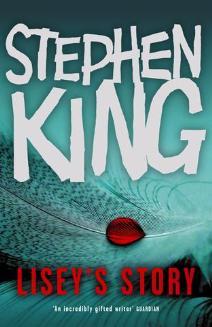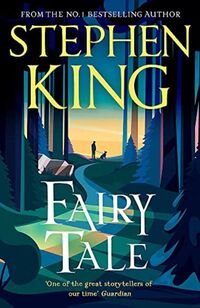In Lisey’s Story King continues with one of his favourite subjects: writers. In a departure from previous novels like Misery, The Dark Half, and Bag Of Bones, the author is dead two years prior to the novel opening. Scott Landon, survived by his wife Lisey, won the Pulitzer and the National Book Award during his short life. It’s no mean feat for an author of horror novels. (Wake up, Stevie, you’re dreaming!) Now, as the story begins, Lisey is preparing to pack up Scott’s scribblings and move on with her life. But, as she enters his study she is taken on trips down memory lane by the objects therein to such events as the couple’s first date and an assassination attempt, John Lennon style, on Scott. The novel, however, isn’t just a nostalgic journey; Lisey’s Story is, at its core, about madness, and there’s a fair peppering of characters a slate short of a roof: Scott’s father, Lisey’s sister, and a loony fanboy who just happens to be in the area. Nice. And it’s this lunatic, threatening Lisey to offer Scott’s papers to the local university, that forms much of the drama within the novel’s here and now.
As a read, the first 150 pages were a disorganised mess. It is apparent that King has attempted something different to his usual work, grappled with stylistic decisions, and not managed to pull it off. What we have here is a collection of memories, one after the other, that serve to portray Scott Landon as the man Lisey loved. They are lifeless recollections, told in the present tense for immediacy, but they fail to connect with any empathy the reader may have for their predicament. And so it continues, stories told without lustre, which is disappointing given that, while told in the third person, the scenes often delve into Lisey’s mind. Aren’t her memories exciting? The reason, to take the assassination attempt as an example, is that King is trying to cram every detail into the scene (and one which happens all too fast) rather than giving only the pertinent details.
It picks up, however, with the introduction of the aforementioned fanboy as the drama begins to mount in the present, bringing Lisey out of her dull reveries. And, just as soon as the book becomes interesting, it commits literary seppuku and delves back into the past. The more we learn of Scott, the more Lisey remembers of him. So it comes to pass that, like King himself, Scott had a personal demon in the booze. Scott, also, to give the book a supernatural twist, has a place called Boo’Ya Moon in which he retreats. It’s a place that he finds both a relief and terrifying in equal measure.
The biggest problem with Lisey’s Story is that it is wordy. Not just verbose to the point where an editor’s red pen may have saved it, but wordy in the sense that it’s full of meaningless words. In an attempt to catalogue the interior language of the Landons’ marriage, King puts some of the stupidest twee phrases ever put in print into the mouths of his own characters. Thus Lisey, around fifty years old, goes around calling her elder sister ‘Big Sissa Manda Bunny’ and excessively using the word ‘smucking’. Scott, in the past, talks of nonsense such as bools, which seem to be some confused mess of clues and/or gifts. Attempts to explain it fall by the wayside and this reader was left just as confused as Lisey first was when Scott came up to her, his wrists bleeding on their first date and offered her his blood-bool. The biggest problem with this twee verbage isn’t that it’s utter nonsense, it’s that King actually declares it as ‘the interior language of their marriage.’ I guess he’s never read the show don’t tell part of his own On Writing.
I honestly think that the biggest problem that I had with Lisey’s Story is that King’s prose is just one big ramblesnooze. That, and the fact that it’s full of annoying phrases. Not signature phrases attributed to characters, as there’s nothing wrong with that, but the continual poor attempt at introducing them: ‘like so-and-so used to say’, ‘as they say’, ‘so-and-so used to call them’ ‘what so-and-so referred to as’, and so on ad infinitum. The other annoying aspect to the prose was the way that, rather than just tell the reader what the character was thinking, he would interrupt a paragraph with a bracketed sentence before continuing the narrative.
As for the characters, they just lacked spirit. Lisey, despite being the eponymous title of the novel, doesn’t have much of a story to tell. She wanders about, remembers a few things, and not much else until the denouement. Scott, as a character, came across much better but that’s because he had a more interesting past, a broken home, the death of an older sibling, and a father certifiably mad. The other major player, the lunatic, works, although his appearances are few, his spectre still lingers throughout. Lesser used characters come and go, some more believable than others, but King really needed everyone to be plausible for his work to be more credible.
While I didn’t like Lisey’s Story, I can find no fault with the idea, the notion of a spouse cleaning up the unfinished works of an author while grubby hands wait to get their eyes on them. And to catalogue a love that endures, even after death. It’s just a pity that King thought of it. But I think that the novel would have been much better if King could tighten his prose, ditch silly get-out devices like Boo-Ya Moon, cut the glut of phrases and just write, and finish the story when it has met its natural conclusion rather than just saunter about for sixty pages cleaning up the loose ends. Next time Lisey has a story to tell, I won’t be listening.


I’m convinced that King doesn’t have an editor. Or that the editor doens’t read anything before passing it on.
I wonder if King’s writing is often like this. Have you read other King books?
I read King’s On Writing and wrote a negative review (I thought he was full of himself and crap and that’s about it) but I’ve never read any other novels by King. So I feel I am a bit unfair in my overall personal judgment that King’s writing is always bad…
Thoughts?
Yes, I’ve read other King books, but moreso when I was a teenager. I think his casual buddy-style of writing eventually becomes tiring and leaves you wondering what else is out there. At the start his novels were better (Carrie, for example) and his short stories were worth a look, but as the years have gone by it seems he’s been given free rein to go and write – and write and write! – without being called on it, so much so that he’s verbose. Even his idea of a short story, these days, is what anyone else would call a novel.
Since you’ve read On Writing you’ll know that part of his problem is redrafting. To him, it’s three drafts and out the door, and these redrafts tend just to be the excision of adverbs and adjectives, the changing of names, and shoehorning a bit of extraneous research in after the fact.
Thanks for the input as to the novels. Interesting that my husband also went through a Stephen King phase when he was 14. Must be the age to appreciate it.
I was not impressed with his drafting suggestions as you say. But I’ve never published anything let alone even write a novel, so there you go.
If the drafting thing works for him, it works for him. But I got the impression from Lisey’s Story that he was trying to branch out, to produce something more stylistic, as if to justify that Contribution to American Letters medal he received years back. If, however, he wanted to make the novel more coherent – and, well, good – then it was going to take more than just removing the adverbs. Sometimes whole passages need to be cut, replaced with a biting line that conveys more than it says.